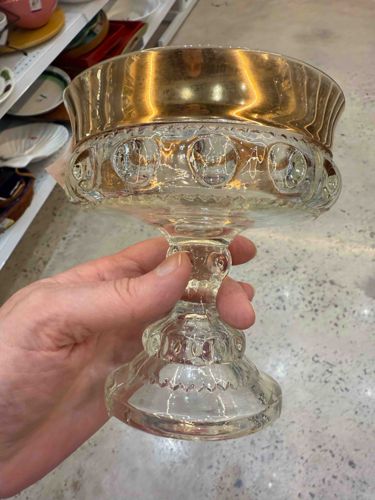
Footed Glass Compote with Gold Rim
This is a clear glass footed compote or candy dish with a distinctive gold-tone rim. The bowl of the compote features a repeating pattern of raised circular designs, often referred to as 'thumbprint' or 'button and cane' patterns. The glass is thick and appears to be pressed glass, indicating it was likely manufactured in a mold. The stem is also decorated with molded details, including a bulbous section above the base and a faceted ring just below the bowl. The base is broad and stable with a stepped profile featuring another row of pointed or sawtooth-like molded details around the perimeter. The gold-tone finish on the interior rim is somewhat worn in places, revealing the clear glass beneath, which is consistent with age and use. There are no visible chips or cracks in the glass, although some light surface wear and possibly some minor internal manufacturing flaws (like bubbles or mold lines) may be present, which is typical for pressed glass of this era. The overall style suggests it could be from the mid-20th century or possibly earlier, a common design for serving sweets or small fruits.
AI-Generated Appraisal Disclaimer
Estimated Value
$25-50
Basic Information
Category
Glassware
Appraised On
January 21, 2026
Estimated Value
$25-50
Item Description
This is a clear glass footed compote or candy dish with a distinctive gold-tone rim. The bowl of the compote features a repeating pattern of raised circular designs, often referred to as 'thumbprint' or 'button and cane' patterns. The glass is thick and appears to be pressed glass, indicating it was likely manufactured in a mold. The stem is also decorated with molded details, including a bulbous section above the base and a faceted ring just below the bowl. The base is broad and stable with a stepped profile featuring another row of pointed or sawtooth-like molded details around the perimeter. The gold-tone finish on the interior rim is somewhat worn in places, revealing the clear glass beneath, which is consistent with age and use. There are no visible chips or cracks in the glass, although some light surface wear and possibly some minor internal manufacturing flaws (like bubbles or mold lines) may be present, which is typical for pressed glass of this era. The overall style suggests it could be from the mid-20th century or possibly earlier, a common design for serving sweets or small fruits.
Get Your Items Appraised
Instant estimates of your treasures with AI-powered instant appraisals